Intervention may involve:
- Hands on techniques
- Soft tissue and massage techniques
- Stretching and stability exercises
- Further development of workplace and home self management strategies
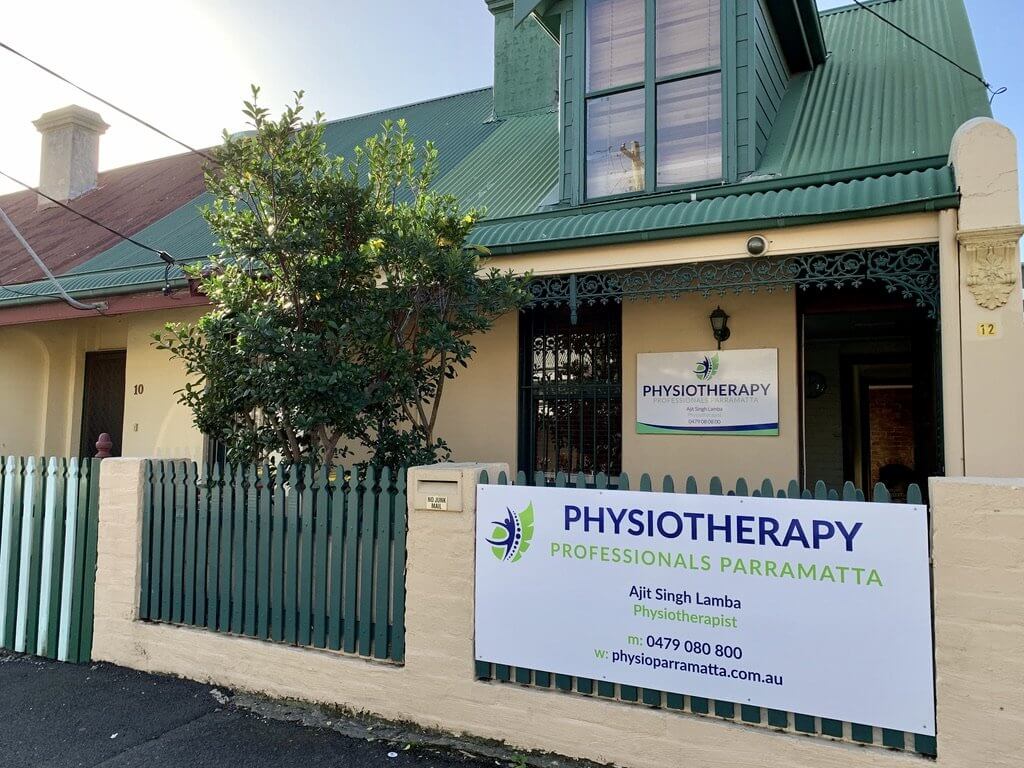
Were you injured at work? Understnading Work Cover can be confusing as you may be the first person at your work place who is going through is process. In most cases your employer might not fully understand what to do in this situation either. This article explains everything you need to know about working with a Physiotherapist on your road to recovery.
Also known an iCare. Work Cover is a Government supported insurance which supports the worker after sustaining an injury at work. If you were injured at work, WorkCover insurance covers your wages, medical costs during the time your injury. WorkCover provides assistance to get you back to your pre injury duties.
For more information on how we can further assist you, please call our clinic number on 0479 080 800 or send us an email on admin [email protected] for further details. Our Physiotherapists are Medicare, NDIS, DVA and Work Cover approved, specialising in injury management and rehabilitation to get you back on track.

Workplace rehabilitation is the process of assisting and providing an injured worker treatment and assistance to return to work after sustaining an injury. Part of the rehabilitation process may involve developing a program that allows them to return to suitable duties. This involves communication with the injured worker, the GP, the treating Physiotherapist, and the employer. And in complex cases, a Rehabilitation consultant who over see’s the entire process. Our key role as Physiotherapists besides providing treatment is to assist you gradually to returning the injured worker to their pre-injury role.
There are many parties involved in the rehabilitation of an injured worker:
For most workers, sustaining an injury may be their first time. There is a certain shock of sustaining an injury and not understanding its severity can result in delayed evaluation and treatment. As such, there is a huge importance placed by Work Cover to provide early assessment and treatment of the injured worker. This is to allow the worker full medical care which usually results in early return to work. Early return to work is associated with huge mental health benefits.
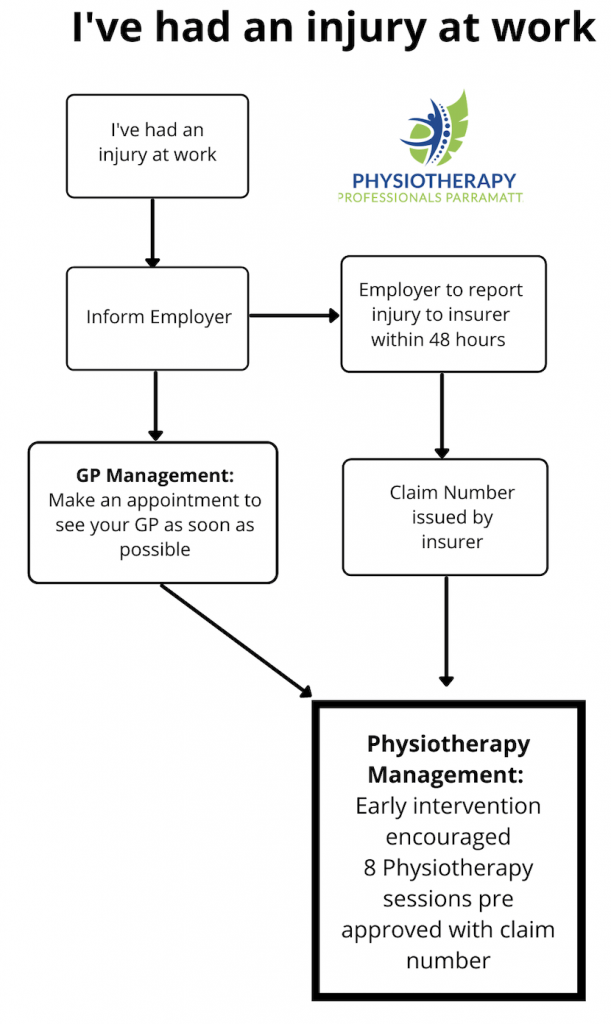
For more information on how we can further assist you, please call our clinic number on 0479 080 800 or send us an email on admin [email protected] for further details. Our Physiotherapists are Medicare, NDIS, DVA and Work Cover approved, specialising in injury management and rehabilitation to get you back on track.



Physiotherapy Professionals Parramatta advocates only the provision of evidence based approaches to acute injury management. The injured worker is entitled to choose their own Doctor and Physiotherapist for all treatment.
For more information on how we can further assist you, please call our clinic number on 0479 080 800 or send us an email on admin [email protected] for further details. Our Physiotherapists are Medicare, NDIS, DVA and Work Cover approved, specialising in injury management and rehabilitation to get you back on track.


Symptoms after a car accident vary and can become long-term and serios symptoms. In addition to emotional and mental trauma, a car accident may cause physical damage to the body that can affect one’s quality of life. Some injuries may not be evident following the incident. It may take a few days before the symptoms start to show. This is very common comment from the patients we see at Physiotherapy Professionals Parramatta. Getting immediate treatment is crucial to prevent injuries from causing more complications. Most car accident related injuries can be treated effectively through Physiotherapy.
The most common types of injuries that can result from a car accident can frequently be treated and resolved through physiotherapy treatment, getting you back in step with your daily routine pain-free.
Symptoms can include neck pain, stiffness, and restricted neck mobility, with symptoms sometimes taking days or weeks to develop. Pain and discomfort may worsen over time with movement. An X-ray, CT scan, or Magnetic Resonance Imaging (MRI) may be required for proper diagnosis. It is quite possible scans will not show any changes as whiplash injuries often do not show up but do create symptomatic changes.
Early intervention following a car accident promotes recovery from injuries. Initial treatments, including hands on Physiotherapy, manual therapy and pain relievers, are meant to relieve pain and prevent aggravating injuries and do not directly address and treat damaged soft tissues and other underlying problems.
No matter how minor the injury may seem, seek medical treatment as soon as possible. Generally, injuries can have a different impact on each body part. The type of therapy needed and period of recovery may depend on the affected body part and the severity of the injury. Through proper diagnosis and personalized treatment, you can live a pain-free life and regain mobility.
Seeking immediate medical attention is also essential in avoiding long-term health-related consequences. Getting a professional health evaluation helps identify injuries you are not aware of, which may likely get serious without treatment.
For more information on how we can further assist you, please call our clinic number on 0479 080 800 or send us an email on admin [email protected] for further details. Our Physiotherapists are Medicare, NDIS, DVA and Work Cover approved, specialising in injury management and rehabilitation to get you back on track.


Symptoms of a whiplash may or may not improve over time. The symptoms may go away on its own after a few days or a couple weeks with treatment. It should be treated carefully and under the supervision of a Physiotherapist. Basic at home treatment options include using an heat or ice pack immediately after the accident in 5-10 minute intervals, following it after a couple days with a heating pad or hot towel. Over the counter painkillers can also be effective for reducing stiffness and pain. In some cases, a soft foam collar may be beneficial. A physiotherapist can help determine other exercises or treatment methods that will help alleviate whiplash.
It’s important to seek further medical attention if the symptoms don’t disappear in this time period, if the pain spreads to shoulders and arms, or you experience numbness and tingling. Symptoms can dramatically improve with the right medical advice and other treatments like physiotherapy.
Whiplash symptoms usually begin within 6 to 12 hours after the injury but in severe cases it can be immediate. Often there is discomfort on the day of the injury leading to later onset of pain, swelling or bruising that can increase over subsequent days. Common symptoms of whiplash include:
Various physiotherapy treatments can be used for whiplash to help reduce the symptoms and severity of the condition. Whiplash physiotherapy treatments can include:
For more information on how we can further assist you, please call our clinic number on 0479 080 800 or send us an email on admin [email protected] for further details. Our Physiotherapists are Medicare, NDIS, DVA and Work Cover approved, specialising in injury management and rehabilitation to get you back on track.


Whiplash is a term that describes a range of head and neck injuries resulting from hyperextension and hyperflexion of the spine. Most commonly, this means when your body is moving forward and suddenly stops, your head jerks forward and backwards in a very fast motion. This condition is most often associated with car accidents such as rear end collisions, but any forceful blow to the head or body is capable of causing whiplash.
When this motion occurs, the bones in the neck become an abnormal S-shape rather than a natural curved C-shape. This causes pain, stiffness, and swelling in the neck, face, and head that can get progressively worse and last for weeks before dissipating. There may also be cognitive effects, such as dizziness, memory problems, and difficulty concentrating. In some cases, the effects of whiplash are felt longer or more severely and more aggressive treatments are required.
Whiplash symptoms usually begin within 6 to 12 hours after the injury but in severe cases it can be immediate. Often there is discomfort on the day of the injury leading to later onset of pain, swelling or bruising that can increase over subsequent days. Common symptoms of whiplash include:
Symptoms of a whiplash may or may not improve over time. The symptoms may go away on its own after a few days or a couple weeks with treatment. It should be treated carefully and under the supervision of a Physiotherapist. Basic at home treatment options include using an heat or ice pack immediately after the accident in 5-10 minute intervals, following it after a couple days with a heating pad or hot towel. Over the counter painkillers can also be effective for reducing stiffness and pain. In some cases, a soft foam collar may be beneficial. A physiotherapist can help determine other exercises or treatment methods that will help alleviate whiplash.
It’s important to seek further medical attention if the symptoms don’t disappear in this time period, if the pain spreads to shoulders and arms, or you experience numbness and tingling. Symptoms can dramatically improve with the right medical advice and other treatments like physiotherapy.
Various physiotherapy treatments can be used for whiplash to help reduce the symptoms and severity of the condition. Whiplash physiotherapy treatments can include:
The earlier the Physiotherapy starts after the event, the better. Physiotherapy is imperative to prevent lasting damage and chronic pain from the condition. Without proper treatment, whiplash can deviate into other more serious conditions, such as chronic whiplash, concussion, joint disfunction, disc herniation, and permanent faulty movement patterns and posture. Physiotherapy for whiplash will help reduce the likelihood of these conditions. If you’ve been involved in a motor vehicle accident resulting in a whiplash recently or are suffering from chronic whiplash, contact us today. We can help find a whiplash treatment plan that is right for you and help you alleviate the symptoms.
For more information on how we can further assist you, please call our clinic number on 0479 080 800 or send us an email on admin [email protected] for further details. Our Physiotherapists are Medicare, NDIS, DVA and Work Cover approved, specialising in injury management and rehabilitation to get you back on track.


Physiotherapy Professionals in Parramatta treat neck injuries with evidence based treatments. Neck injuries can happen after sports, work injury or even a car accident. We provide guidance and treatment for pain relief and return to sport, work and daily activities. Evidence based treatments have been shown to be effective through clinical research, giving people a successful return to sport and life.
The structure of the neck is a complex. The neck also known as the Cervical Spine includes seven bones called vertebrae stacked on top of each other like lego blocks and connected by two joints above and below. Each joint has is own ligaments, capsule and muscles that connect onto it providing support and movement. Within each vertebra runs the spinal cord in what is called a spinal canal. The nerves then exit in between each vertebra to supply signals from the brain to control different parts of our body.
The number one source of whiplash is car accidents and contact sports. Generally any injury involving trauma which causes sudden acceleration and deceleration force to the neck can cause a whiplash. This can cause excessive movement of the neck and result in an injury to the tendon, muscles, joints, nerves and other soft tissues.
Whiplash symptoms depending on the severity of the injury can include pain, stiffness, headaches, weakness and nerve related symptoms.
Research evidence for the treatment of whiplash supports advice to remain active and depending on the degree of the injury, a graded exercise exercise program with activity modifications and some hands on therapy.
Wry neck is a condition where your neck gets “stuck” in a particular position. Due to pain, stiffness and tightness in the neck muscles, the neck range of movement becomes extremely limited.
Wry neck can result from a sudden movement but also occurs after a long period of resting in an awkward neck position most commonly after a deep sleep or working on a laptop in an odd position .
Treatment for a wry neck can depend on the cause of the injury. Generally, treatment involves using techniques to reduce muscle tightness and joint stiffness. Later stages of treatment focus on relaxing muscle tightness and weakness.
Neck pain can arise as a result of tension in the muscles surrounding the neck. This can be associated with factors such as stress, weak muscles and fatigue from prolonged sustained postures.
There is good evidence from the University of Queensland that a graded exercise program that focuses on correcting the tension by strengthening the muscles in the neck and shoulder can significantly reduce neck pain long term.

CTP Insurance Physiotherapy Claims
What to do after a car accident

Physiotherapy Professionals Parramatta provides help for whiplash and whiplash neck sprain to Parramatta and surrounding suburbs.
A whiplash neck sprain occurs when your head is suddenly jolted backwards and forwards in a whip-like movement usually caused in motor car accidents known as a “rear-ender”. These movements generate considerable force, typically causing the neck to move far beyond the normal range of movement and causes damage to the delicate supporting structures of the neck. Whiplash is effectively a sprain of the joints in the neck – Physiotherapists refer to this as a vertebral dysfunction.
Whiplash can also result from forceful sporting injuries that cause similar stress to the neck joints, ligaments, muscles and discs.
Whiplash neck sprains are common. About 2 in 3 people involved in car accidents develop neck pain (with or without other injuries). Many people are surprised with the onset of neck pain following even minor accidents some hours following the accident. It is important to note that even minor car bumps can cause enough whipping of the neck to cause symptoms. Less commonly, whiplash can result from everyday mishaps such as jolting your neck when you trip of fall.
The symptoms of whiplash will vary person to person, the following represent the most frequently noticed effects of whiplash.
Physiotherapy management of whiplash is extremely effective. All Physiotherapy care initially consists of a through history, orthopaedic, neurological and spinal examination to determine the exact location of your neck pain. Diagnostic imaging such as Xray, CT, MRI and postural scans may also be required to fully assess any damage.
Treatment consists of reducing pain and inflammation and stabilising your neck to prevent further damage. Ice and heat are perhaps the best natural modalities and can be very soothing when your neck is painful.
If you are able to support your head and neck, it is especially important to keep your neck mobile rather than immobilizing it in a soft cervical collar. Studies have shown that you are more likely to make a quicker recovery if you do regular neck exercises, and keep your neck active rather than resting it for long periods in a collar.
As your pain decreases, and your stability improves, your physiotherapist will massage and gently mobilize your spine to help improve your neck function and reduce nerve pressure.
Some other helpful advice is to avoid poor neck posture during your daily routine and to use a firm supporting contoured pillow when sleeping.
Whiplash responds very well to Physiotherapy treatment, with most people experiencing significant improvement within weeks of beginning care.
Physio Parramatta has a proven and effective treatments for whiplash injuries including relieving headaches, using hands-on techniques to restore normal movement and relieve pain, exercises to regain normal strength and length of muscles, and massage to reduce muscle tension. We will also discuss and advise you on your gradual return to normal activity, exercise and work. A major focus of the treatment of whiplash associated disorders is specific exercises designed to restore muscle control and support around the neck whilst also improving postural control and preventing unnecessary postural strain.
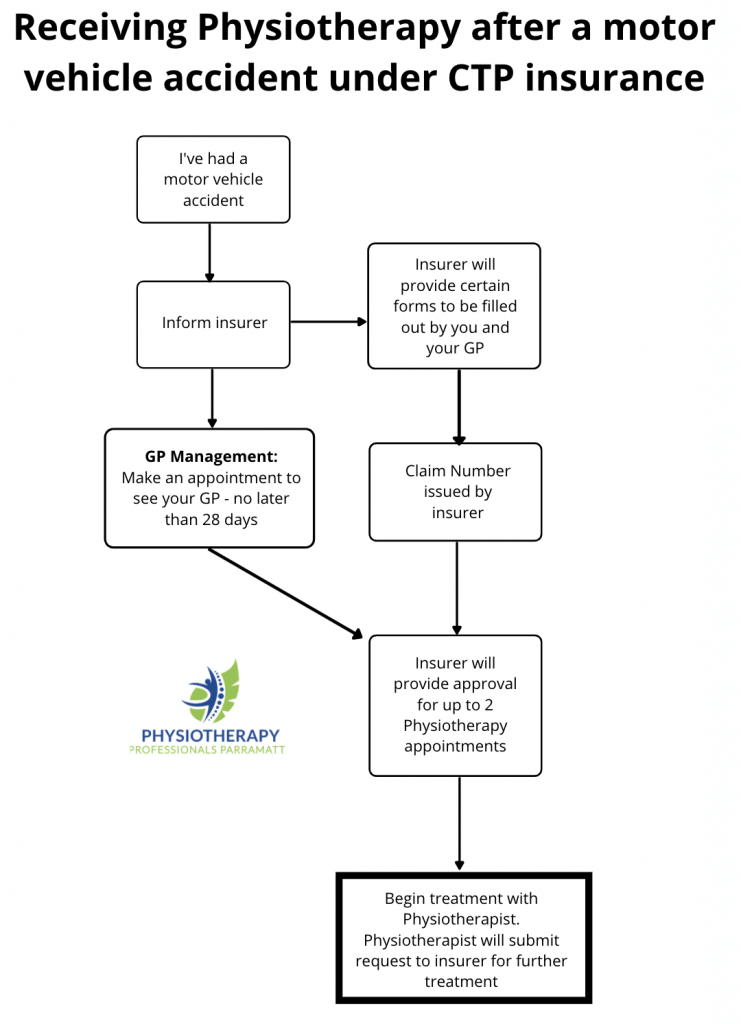
Car accidents (MVA) can happen any time and can cause a lot of headache and grief. CTP insurance (compulsory third party insurance) may cover for your Physiotherapy treatment. Physiotherapy After a Motor Vehicle Accident is crucial and can prevent long term spinal complications.
Please note, prior approval from your CTP insurance company is required. You will also need to visit a GP after your accident, before you can be seen by a Physiotherapist. Not all symptoms will appear immediately after the accident, some symptoms and pains can develop a few days after the accident has taken place. The body often goes into “protection mode” for safety to prevent further damage after an accident. Once the body starts to relax, the pain will will become more apparent.
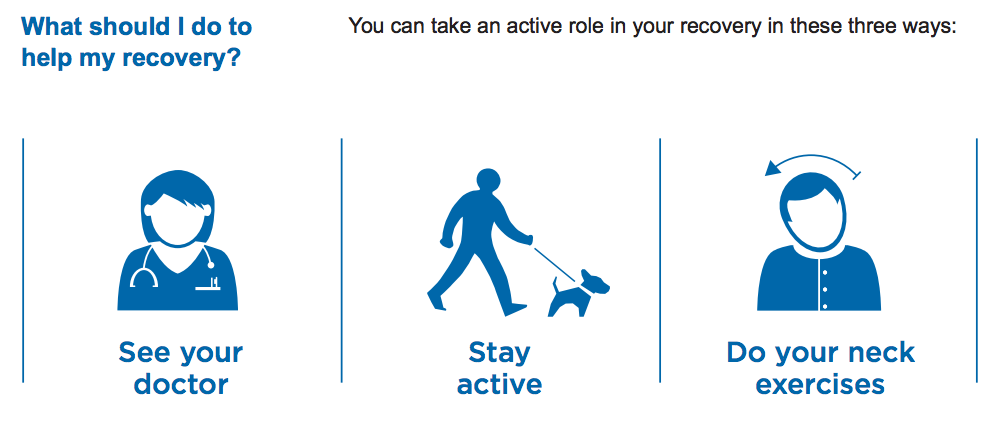
No, we will bill the insurer if all of the following exists:
Contact Physiotherapy Professionals Parramatta. We will assist you with pain management and get you back on track as soon as possible.
If you’ve had a motor vehicle accident and are currently suffering from symptoms, get in touch with Physiotherapy Professionals Parramatta. If you are unsure of the process or where to go, we can guide you through the process and direct you on the right path.
Contact us today on 0479 080 800 to make a booking. Alternatively you can email us on [email protected]. Our Physiotherapists are Medicare, NDIS, DVA and Work Cover approved, specialising in injury management and rehabilitation to get you back to full function.

CTP Insurance Physiotherapy Claims
What to do after a car accident
Physiotherapy After A Car Accident
I Was Injured in a Car Accident. Do I Need to see a Physio?
Car Accident Injury And Treatment
Car Accident Injuries & Treatment: What to Expect Physically After an Accident
Whiplash: What You Should Know About This Common Car Accident Injury

If you answered yes to any of the above questions, you need Physiotherapy treatment for back pain.
Hi. My name is Ajit and I am an Australian Physiotherapist. Since you’re here you may have heard how I have helped a lot of patients over the years become pain free.
Over half of the patients I see are Mothers.
I have found a solution for helping mothers get rid of back pain, to keep their pain gone, and to feel as fit as you were before having kids. I have refined this secret method over the years as a Physiotherapist and I would like to share it with you just like I have with so many others who have been in your position.
Many of these Mothers are now running, exercising, going to the gym and doing things they didn’t think would be possible in their lives because of their back pain.
I would love to share my secret with you on how to get rid of your back pain and keep it gone. It doesn’t take long, it isn’t hard, there is no magic pill and it is something that anyone can do. In fact you can do it in only 5 minutes a day.
Find out how I help my private and corporate clients become pain free. The majority of these clients suffer from back pain just like you. By diagnosing their pain based on my secret formula they get fast results, and feel much better in only 5 consultations using hands on Physiotherapy techniques. No gimmicks. No pills. No unnecessary scans.
What is more is that once the pain is gone I will give you simple exercises and strategies to keep your pain gone, which will take less than 5 minutes per day, perfect for the busy mother.
I look forward to helping you on your journey to pain relief.
Ajit Singh Lamba
Physiotherapist

Mixed Links:
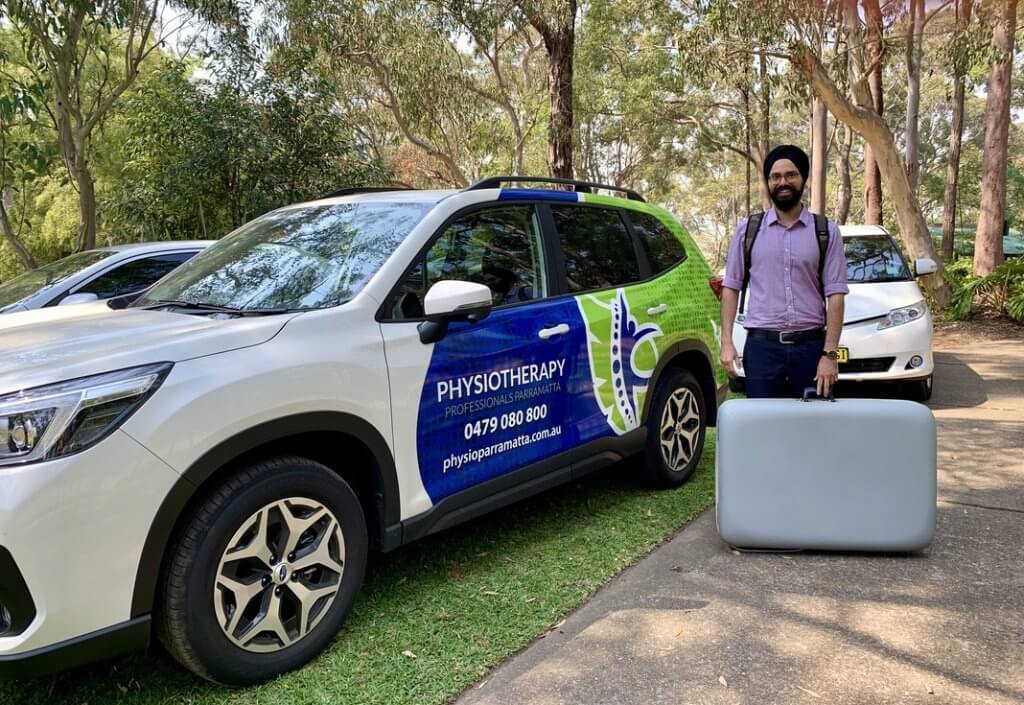
Physiotherapists are health professionals skilled in the assessment, diagnosis, rehabilitation and treatment of people living with a disability.
We can help you with different treatments such as:
We can provide treatment at our Parramatta clinic, but we can also provide treatment at your home (Home visits). You can book in an appointment with one of our specialized Physiotherapist and they will visit you to treat you at home. This way you don’t have to worry about how to get to the clinic.
What services do we offer? Treatment is dependent on your goals and what you would like to achieve. This may include:
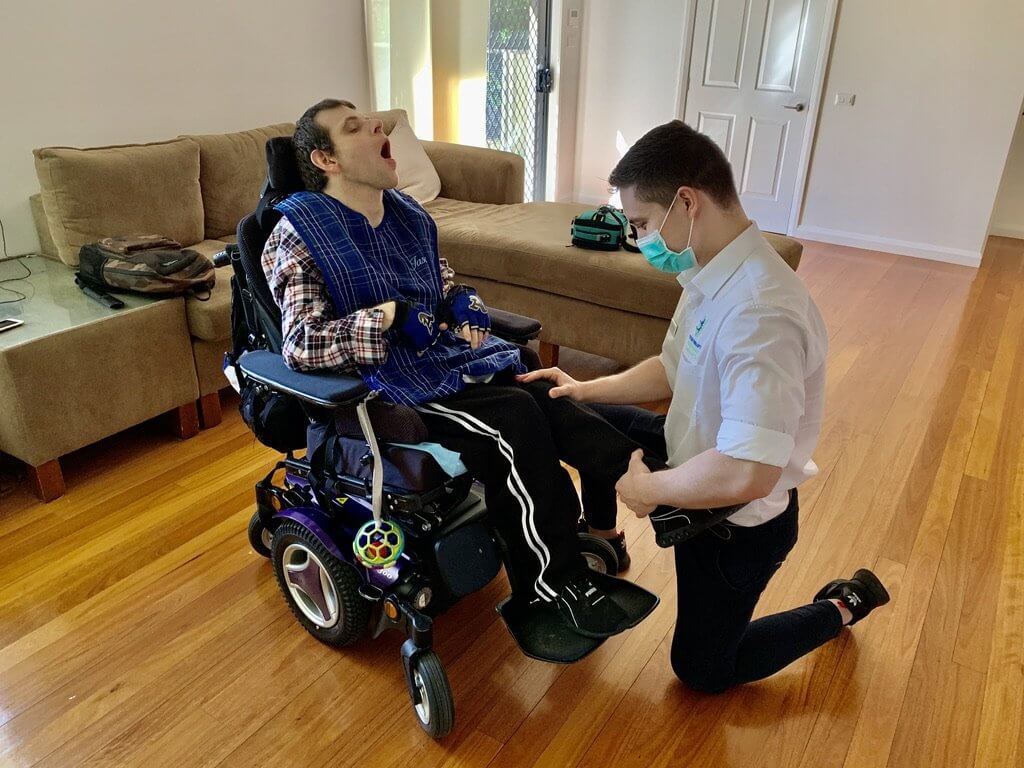
If you’re eligible for NDIS, we encourage you to give us a call on 0479 080 800 we will discuss how we can assist you better. Our clinic is located walking distance from Parramatta and Harris Park stations. We also cater for surrounding suburbs such as Lidcombe, Auburn, Granville, Merrylands, Greystanes, Westmead, Rydalmere and many more.
We invoice the NDIS directly for services for approved clients.
For more information on how we can further assist you, please call our clinic number on 0479 080 800 or send us an email on [email protected] for further details. Our Physiotherapists are Medicare, NDIS, DVA and Work Cover approved, specialising in injury management and rehabilitation to get you back on track.
Ajit Lamba and Daniel Stone. Physiotherapists providing NDIS services.
CTP Insurance Physiotherapy Claims
What to do after a car accident
Physiotherapy After A Car Accident
I Was Injured in a Car Accident. Do I Need to see a Physio?
Car Accident Injury And Treatment
Car Accident Injuries & Treatment: What to Expect Physically After an Accident
Whiplash: What You Should Know About This Common Car Accident Injury